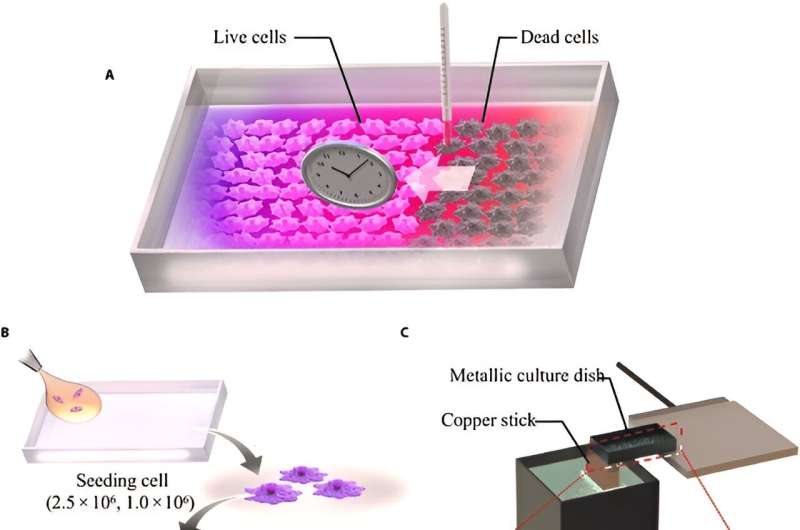This article has been reviewed according to Science X's editorial process and policies. Editors have highlighted the following attributes while ensuring the content's credibility:
fact-checked
peer-reviewed publication
proofread
A cell culture system with temperature gradients to study optimal conditions for effective hyperthermia

Hyperthermia is a potentially non-invasive cancer treatment that capitalizes on the heat intolerance of cancer cells, which are more sensitive than normal cells. In order to induce effective hyperthermia, it is necessary to apply the appropriate temperature according to the cell type, i.e., to comprehensively study the thermal toxicity of the cells, which requires accurate regulation of the culture temperature.
Researchers from Keio University in Japan have developed a cell culture system with temperature gradients on a metallic culture surface that can be used to study the optimal conditions for effective hyperthermia. Their new training scheme is described in a paper published in the journal of Cyborg and Bionic Systems.
Although surgery, chemotherapy and radiation are the major approaches for cancer treatment, each strategy has side effects and aggressiveness. Hyperthermia is considered as a potential cancer treatment due to its minimal side effects and invasiveness. Hyperthermia involves exposing the diseased area to a dose of thermal stimulation thereby selectively killing cancer cells where thermal cytotoxicity is more prominent.
However, regulating the temperature of the cell incubator cannot immediately and accurately apply a thermal stimulus to the cells because the temperature of the cell exposure site is indirectly regulated by the mosphere in the incubator.
In order to accurately control the temperature of cell exposure, the researchers fabricated a culture system based on a metallic culture vessel and a Peltier element. Because of the metallic culture surface, temperature stimulation of the cells can be immediately and accurately controlled, and the system can be manipulated to produce a range of temperature gradations, which helps to simultaneously evaluate cellular responses to a variety of temperature stimuli.
Pure titanium culture vessels fabricated by metallic 3D printing were subjected to extensive temperature gradients triggered by iced water and hot plates. The thermal conductivity of metal is higher than that of polystyrene, and the system allows instant temperature regulation compared to traditional plastic containers.
Michigan Cancer Foundation-7 (MCF-7) and normal human dermal fibroblasts (NHDF) were used as model cancer cells and normal cell types, respectively, and the difference in temperature tolerance between the two types of cells was confirmed by determining the area of live and dead cells.
At high cell densities, only the temperature tolerance of NHDF was enhanced, whereas that of MCF-7 was not affected, which is consistent with previous reports.
The results obtained by this system are only guaranteed to be qualitatively similar but quantitatively different. First, since only the nuclei of dead cells are stained, the threshold temperature is not directly indicative of the lethal temperature. Secondly, the surface environment of the petri dish may introduce mechanical stimuli to the cells and affect their thermal response. Finally, cells exposed to different culture temperatures create a chemically stimulated new culture environment by secreting hormones.
Systems that exhibit temperature gradients provide new research directions for future cancer hyperthermia. Using the perfusion culture system to eliminate chemical stimuli as well as impeding cell proliferation to obtain a clearer live/dead cell boundary is a research direction for more accurate evaluation of this system. In addition, the present system can be used for other purposes to assess the thermal response of cells.
More information: Chikahiro Imashiro et al, Titanium Culture Vessel Presenting Temperature Gradation for the Thermotolerance Estimation of Cells, Cyborg and Bionic Systems (2023). DOI: 10.34133/cbsystems.0049


















